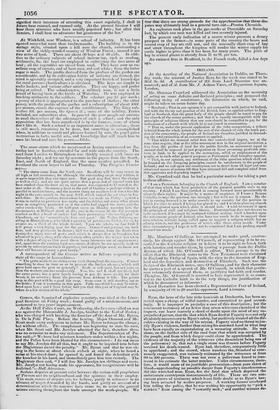At Winkfield, near Windsor, is a school of industry. It
has been opened somewhat more than twelvemonths. The building is in the cottage style, situated upon a bill near the church, commanding a view of the richly-wooded country of 1Vindsor Forest ; around it are two acres of land. There are about 30 boys aid 40 girls. In addi- tion to the ordinary subjects of school instrucion, such as reading, arithmetic, &c. the boys are employed in cultivating the two acres of had; all the vegetables are raised from seed. They have now an ex- cellent crop of carrots, and of beet-root, red and white ; from the latter sugar is made. The profits derived from the produce of the garden are considerable, and by its cultivation habits of industry are formed, the grind is agreeably occupied, and a very important branch of knowledge for rural persons (horticulture) is obtained. The boys are taught to wake baskets, and various other articles. They are happy, and prefer being at school. The schoolmaster, a military man, is not a little proud of having been at the battle of Waterloo. lie was employed in teaching arithmetic to the soldiers. The scholars pay 2d per week ; a penny of which is appropriated to the purchase of clothes ; the other penny, with the profits of the garden and a subscription of about 100/. per annum, covers the expense of the establishment. The King sub- scribes 101. per annum, the Queen ; some of the nobility, Tories Included, are subscribers also. In general the poor people arc anxious to avail themselves of the advantages of such a school ; and the only opposition that has been manifested is by the farmers, some of whom don't like it. Such a school is an important move in education ; there is still much remaining to be done, but something is accomplished when, in addition to words and phrases learned by rote, the pupil gains instruction in facts, useful arts, and knowledge that will teach him to earn his bread and save his pence.—Globe.


























 Previous page
Previous page